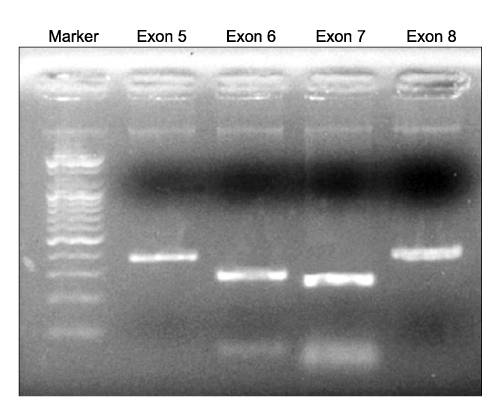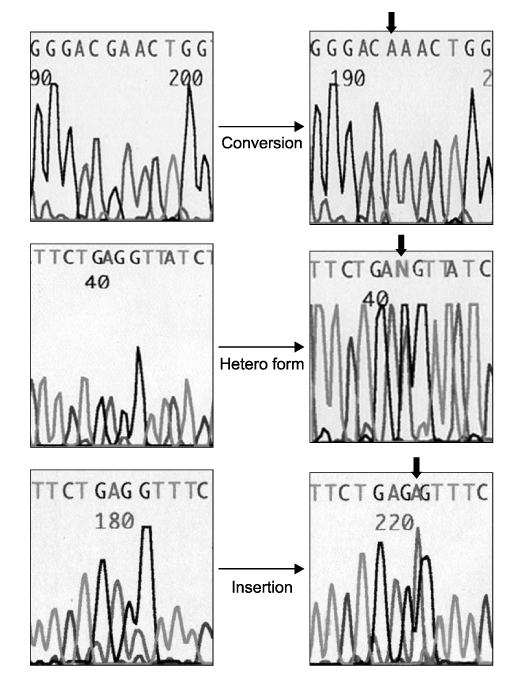Chonnam Med J.
2009 Apr;45(1):47-54. 10.4068/cmj.2009.45.1.47.
The Role of PTEN Mutation in the Development of Endometrial Carcinoma
- Affiliations
-
- 1Department of Pathology, Chonnam National University Medical School, Gwangju, Korea. jhnam@chonnam.ac.kr
- KMID: 2172283
- DOI: http://doi.org/10.4068/cmj.2009.45.1.47
Abstract
- Over the past 2 decades, the tendency has been to classify endometrial carcinoma into 2 different types. Type I tumors (about 80%) are endometrioid carcinomas, are often preceded by complex and atypical hyperplasia, and are associated with estrogen stimulation. Type II tumors (about 10%) are nonendometrioid carcinomas that arise occasionally from precancerous lesions that develop in atrophic endometria. It has been found that the molecular alterations of endometrioid carcinomas, including defects in DNA-mismatch repair and mutations in PTEN (phosphatase and tension homologue deleted in chromosome ten), K-ras, and beta-catenin, are different from those of the nonendometrioid carcinomas. In this study, we analyzed the PTEN mutation by direct DNA sequencing of the endometrial hyperplasia and endometrioid carcinoma in order to investigate the molecular carcinogenesis of Type I endometrial carcinoma. PTEN mutations were detected in 14 (37.8%) of 37 carcinomas, including 8 cases (21.6%) in exon 5, 1 case (2.7%) in exon 6, 5 cases (13.5%) in exon 7, and 3 cases (8.1%) in exon 8. The most frequent site of PTEN mutation was codon 130 on exon 5, which encodes the tyrosine phosphatase catalytic domain. The PTEN mutation was not associated with histologic grade, depth of invasion, or clinical stage. PTEN mutations were also shown in 3 cases (15.8%) of 19 typical endometrial hyperplasias and in 6 cases (28.6%) of 21 atypical endometrial hyperplasias. These results suggest that PTEN is an important target gene in the development of type I endometrial carcinomas and that the presence of PTEN mutations in typical and atypical endometrial hyperplasia suggest that PTEN mutations would occur as early events in the process of type I endometrial carcinogenesis.
Keyword
MeSH Terms
Figure
Reference
-
1. Bockman JV. Two pathogenetic types of endometrial carcinoma. Gynecol Oncol. 1983. 15:10–17.
Article2. Ambros RA, Sherman ME, Zahn CM, Bitterman P, Kurman RJ. Endometrial intraepithelial carcinoma: A distinctive lesion specifically associated with tumors displaying serous differentiation. Hum Pathol. 1995. 26:1260–1267.
Article3. Okamoto A, Sameshima Y, Yamada Y, Techima S-I, Terashima Y, Terada M, et al. Allelic loss of chromosome 17p and p53 mutations in human endometrial carcinoma of the uterus. Cancer Res. 1991. 51:5632–5635.4. Tashiro H, Isacson C, Levine R, Kurman RJ, Cho KR, Hedrick L. p53 gene mutations are common in uterine serous carcinoma and occur early in their pathogenesis. Am J Path. 1997. 150:177–185.5. Fujino T, Risinger JI, Collins NK, Liu F-S, Nishii H, Takahashi H, et al. Allelotype of endometrial carcinoma. Cancer Res. 1994. 54:4294–4298.6. Peiffer SL, Heraog TJ, Tribune DJ, Mutch DG, Gersell DJ, Goddfellow PJ. Allelic loss of sequences from the long arm of chromosome 10 and replication errors in endometrial cancers. Cancer Res. 1995. 55:1922–1926.7. Enomoto T, Inoue M, Perantoni AO, Buzard GS, Miki H, Tanizawa O, et al. K-ras activation in premalignant and malignant epithelial lesions of the uterus. Cancer Res. 1991. 51:5308–5314.8. Enomoto T, Fujita M, Inoue M, Rice JM, Nakajima R, Tanizawa O, et al. Alterations of the p53 tumor suppressor gene and its association of the c-K-ras protooncogene in premalignant and malignant lesions of the human uterine endometrium. Cancer Res. 1993. 53:1883–1888.9. Duggan BD, Felix JC, Muderspach LI, Tsao JL, Shibata DK. Early mutational activation of the c-ki-ras oncogene in endometrial carcinoma. Cancer Res. 1994. 54:1604–1607.10. Esteller M, Garcia A, Martinez-Palones JM, Xercavins J, Raventós J. The clinicopathological significance of K-RAS point mutation and gene amplification in endometrial cancer. Eur J Cancer. 1997. 33:1572–1577.
Article11. Di Cristofano A, Pesce B, Cordon-Cardo C, Pandolfi PP. PTEN is essential for embryonic development and tumor suppression. Nat Genet. 1998. 19:348–355.12. Podsypanina K, Ellenson LH, Nemes A, Gu J, Tamura M, Yamada KM, et al. Mutation of Pten/Mmac1 in mice causes neoplasia in multiple organ systems. Proc Natl Acad Sci USA. 1999. 96:1563–1568.
Article13. Catastis LI, Machin P, Matias-Guiu X, Prat J. Microsatellite instability in endometrial carcinomas. Clinicopathologic correlations in a series of 42 cases. Hum Pathol. 1998. 29:1160–1164.
Article14. Machin P, Catasús LI, Pons C, del Rio E, Matias-Guiu X, Prat J. Beta-catenin mutations and expression in endometrial carcinomas with and without microsatellite instability. 2001. In : 90th Annual meeting; Atlanta. USCAP;(Abstract).15. Li J, Yen C, Liaw D, Podsypanina K, Bose S, Wang SI, et al. PTEN, a putative protein tyrosine phosphatase gene mutated in human brain, breast, and prostate cancer. Science. 1997. 275:1943–1947.
Article16. Weng LP, Smith WM, Dahia PL, Jiebold U, Gil E, Lees JA, et al. PTEN suppresses breast cancer cell growth by phosphatase activity-dependent G1 arrest followed by cell death. Cancer Res. 1999. 59:5808–5814.17. Tamura M, Gu J, Takahasi T, Yamada KM. Tumor suppressor PTEN inhibition of cell invasion, migration, and growth: differential involvement of Focal Adhesion Kinase and p130cas. Cancer Res. 1999. 59:442–449.18. Kurose K, Zhou XP, Araki T, Cannistra SA, Maher ER, Eng C. Frequent loss of PTEN expression is linked to elevated phosphorylated Akt levels, but not associated with p27 and cyclin D1 expression, in primary epithelial ovarian carcinomas. Am J Pathol. 2001. 158:2097–2106.
Article19. Zhu X, Kwon CH, Schlosshauer PW, Ellenson LH, Baker SJ. PTEN induces G1 cell cycle arrest and decreases cyclin D3 levels in endometrial carcinoma cells. Cancer Res. 2001. 61:4569–4575.20. Ali IU, Schriml LM, Dean M. Mutational spectra of PTEN/MMAC1 gene: a tumor suppressor with lipid phosphatase activity. J Natl Cancer Inst. 1999. 91:1922–1932.
Article21. Hayes MP, Wang H, Espinal-Witter R, Douglas W, Solomon GJ, Baker SJ, et al. PIK3CA and PTEN mutations in uterine endometrioid carcinoma and complex atypical hyperplasia. Clin Cancer Res. 2006. 15:5932–5935.22. Sun H, Enomoto T, Fujita M, Wada H, Yoshino K, Ozaki K, et al. Mutational analysis of the PTEN gene in endometrial carcinoma and hyperplasia. Am J Clin Pathol. 2001. 115:32–38.
Article23. Lee JO, Yang H, Georgescu MM, Di Cristofano A, Maehama T, Shi Y, et al. Crystal structure of the PTEN tumor suppressor: implications for its phosphoinositide phosphatase avtivity and membrane association. Cell. 1999. 99:323–334.24. Minaguchi T, Yoshikawa H, Oda K, Ishino T, Yasugi T, Onda T, et al. PTEN mutation located only outside exons 5, 6, and 7 is an independent predictor of favorable survival in endometrial carcinomas. Clin Cancer Res. 2001. 7:2636–2642.25. Tashiro H, Blazes MS, Wu Rong, Cho KR, Bose S, Wang SI, et al. Mutations in PTEN are frequent in endometrial carcinoma but rare in other common gynecological malignancies. Cancer Res. 1997. 57:3935–3940.26. Kurman RJ, Karminski PF, Norris HJ. The behavior of endometrial hyperplasia. A long-term study of untreated hyperplasia in 170 patients. Cancer. 1985. 56:403–412.
Article27. Boruban MC, Altundag K, Kilic GS, Blankstein J. From endometrial hyperplasia to endometrial cancer: insight into the biology and possible medical preventive measures. Eur J Cancer Prev. 2008. 17:133–138.
Article28. Levine RL, Cargile CB, Blazes MS, van Rees B, Kurman RJ, Ellenson LH. PTEN mutations and microsatellite instability in complex atypical hyperplasia, a precursor lesion to uterine endometrioid carcinoma. Cancer Res. 1998. 58:3254–3258.29. Maxwell GL, Risinger JI, Gumbs C, Shaw H, Bentley RC, Barrett JC, et al. Mutation of the PTEN tumor suppressor gene in endometrial hyperplasias. Cancer Res. 1998. 58:2500–2503.
- Full Text Links
- Actions
-
Cited
- CITED
-
- Close
- Share
- Similar articles
-
- PTEN and p53 Mutations in Endometrial Carcinomas
- Loss of PTEN Expression in Breast Cancers
- Sensitizing endometrial cancer to ionizing radiation by multi-tyrosine kinase inhibition
- Identification of a Novel p53 Intronic Mutation in Cowden's Disease
- Loss of Expression of the PTEN Gene Product in the Infiltrating Ductal Carcinoma of the Breast and Its Relationship with Clinicopathologic Factors



